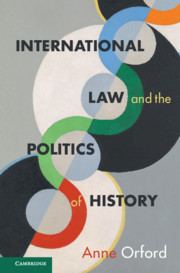Book contents
- International Law and the Politics of History
- International Law and the Politics of History
- Copyright page
- Contents
- Acknowledgements
- 1 Neoformalism and the Turn to History in International Law
- 2 Situating the Turn to History in International Law
- 3 History and the Turn to the International
- 4 History’s Lawyers
- 5 The Past in the Practice of International Law
- 6 The History of What?
- 7 Why Study the Past of International Law?
- Bibliography
- Index
6 - The History of What?
Published online by Cambridge University Press: 18 June 2021
- International Law and the Politics of History
- International Law and the Politics of History
- Copyright page
- Contents
- Acknowledgements
- 1 Neoformalism and the Turn to History in International Law
- 2 Situating the Turn to History in International Law
- 3 History and the Turn to the International
- 4 History’s Lawyers
- 5 The Past in the Practice of International Law
- 6 The History of What?
- 7 Why Study the Past of International Law?
- Bibliography
- Index
Summary
This chapter challenges the claim that historians are able to offer value-free, impartial, and verifiable observations about the history of something called ‘international law’. While numerous historians have criticised international legal scholars for misusing the past to tell stories, draw analogies, or link material from diverse periods, historical work is presented as a process of finding evidence rather than making arguments, committed to reality rather than myths. This chapter argues that histories of international law are necessarily as partisan and political as those produced by the most pragmatic of lawyers. Any study that is described as offering a history of something called ‘international law’, or of a subfield of international law such as international economic law or human rights law, necessarily makes normative and political choices about what international law is and where it is to be found. To show how that works in practice, the chapter explores three empiricist historical accounts that are overtly presented as offering correctives to the distorted, presentist, or incomplete histories of international law produced to date – Lauren Benton and Lisa Ford’s Rage for Order, Samuel Moyn’s The Last Utopia, and Quinn Slobodian’s Globalists.
Keywords
- Type
- Chapter
- Information
- International Law and the Politics of History , pp. 253 - 284Publisher: Cambridge University PressPrint publication year: 2021

